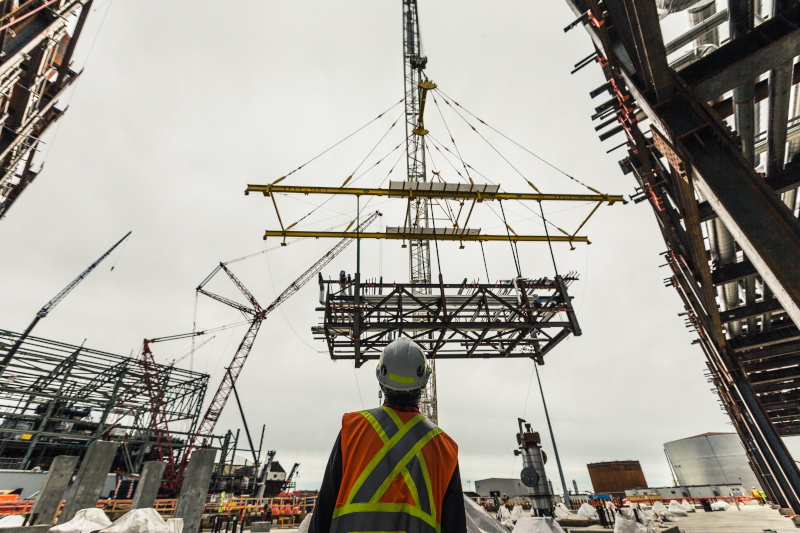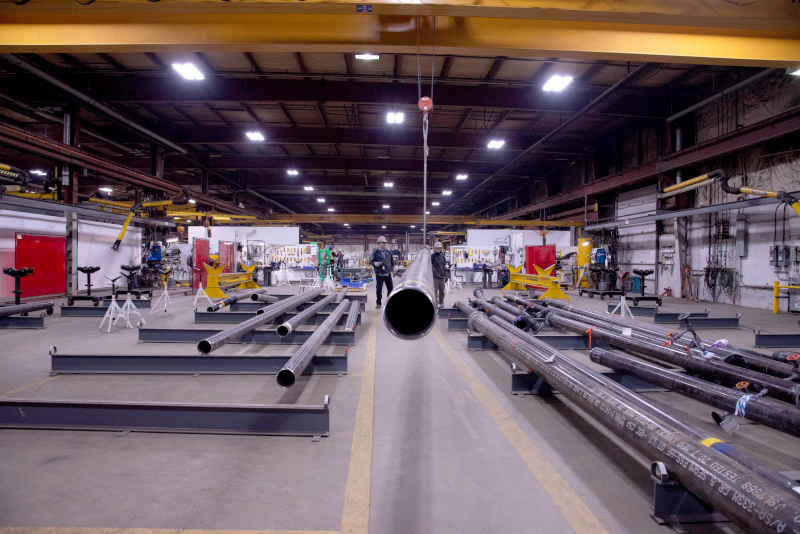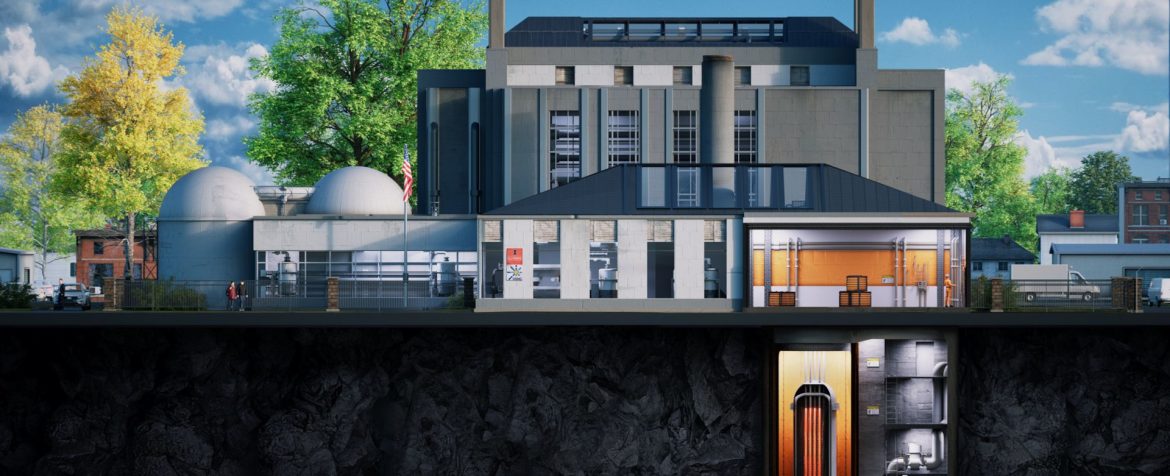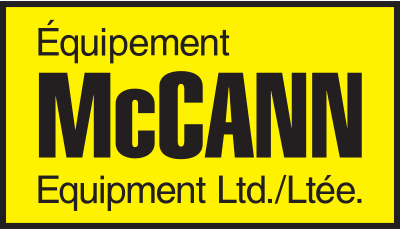PCL Construction – Nuclear
Powering the Path to Clean Energy
Safe and imaginative reactor technology lays down a modular foundation for Canada’s Nuclear Renaissance
The global energy sector finds itself at a crossroads, with the urgency to transition towards cleaner energy sources being more pronounced than ever.
First, there is the need to curb carbon emissions and greenhouse gases. Secondly, the transition to sustainable energy often requires upfront investments in infrastructure, which are significant financial barriers for both governments and businesses.
The key is to strike a balance between reducing emissions and ensuring that energy remains affordable for consumers. Technological innovation is the catalyst that drives this transformative process.
At the forefront of this transformative journey is PCL, a 117-year-old 100% employee-owned company that has been deeply involved in the energy production landscape for decades.
They offer a positive change in the energy sector through the innovative nuclear reactor technology they’re constructing. As the largest construction company in Canada and a major player in the U.S., they’re playing a pivotal role in shaping a greener, more sustainable world for future generations.
By addressing these challenges head-on, PCL is proclaiming the above as part of its larger company vision and contribution to the world.

Construction of a heavy industrial modular project.
An Overarching Context of Carbon Emissions
Globally, greenhouse gas emissions are a hot topic, and at this point, they have compelled virtually every country to set emission targets to combat the ongoing effects of climate change.
Gradual increases in carbon taxation are becoming a huge expense for both consumers and companies, so the question is now how to effectively tackle the issue of energy generation on a country-wide scale.
Currently, PCL has firmly established itself in the nuclear space for one overarching reason: to help accelerate Canada’s transition into more efficient energy alternatives.
Since the company has been in business for over a century, it has actually played a key role in building the foundations for multiple energy transitions.
“We were part of developing or building all the coal plants, and then natural gas came along, and we built that transition over to natural gas as well,” says Chief Nuclear Officer Louie Shoukas.
According to Shoukas, their active involvement in setting up those key infrastructures made PCL increasingly aware of certain pitfalls involved with the usage of those resources, as well as the renewable energy sources that subsequently emerged as an alternative.
Primarily, coal and natural gas are some of the largest contributors to greenhouse gas emissions. However, even with renewable energy alternatives like wind, solar, and hydroelectric power, the impact on the landscape required to create the infrastructure needed to capture that natural energy is both extremely costly and time-consuming.
To add to that, the natural weather patterns that those renewable energies rely on are far too unpredictable for any company to be able to completely rely on 24/7 as a zero-emission power source.
When the wind’s not blowing, the sun’s not shining, and there’s no more nearby land to conveniently build hydroelectric power dams on, there’s no way to move forward.
However, this only applies to the energy sources above. The cons associated with natural gas and renewables actually make way for a longer list of pros when it comes to nuclear energy.
Fortunately, Canada is a prime location to further the progress of nuclear development, as it already has much of the technological infrastructure in place in some of its key provinces, namely Ontario, New Brunswick, and Quebec, which all have reactor plants.
Additionally, as a country, Canada is fully equipped to be able to smoothly handle such a large transition.
“Canada’s in a very good position to deploy nuclear across Canada because we are a tier one country when it comes to nuclear,” Shoukas explains, “the entire process, cradle to grave, as a country, we can manage it amongst ourselves, we don’t need any outside support.”
This means that everything from digging up uranium to processing and fabricating fuel to designing and constructing the reactors and even the regulation can be handled by Canada alone.
Since PCL has led every other major energy transition in the country, it only makes sense that the company is rightfully leading Canada through this newest transition into nuclear energy.
Given that PCL has over a century of experience in piloting transitions like this, they are by far the most qualified party to do so.
Dispelling the Myths of Nuclear Energy with Innovation
Even with an experienced giant like PCL leading the charge, there will always be resistance to big changes simply due to misconceptions.
When the word “nuclear” is mentioned as an energy alternative, there will always be those who associate it with obvious negative disasters. Still, there’s a lot of dogma around nuclear energy that needs to be addressed.
Project Manager Peter Tawfik does this succinctly, saying, “Nuclear bombs and nuclear energy are not akin… when you talk of Chernobyl, Fukushima, Three Mile Island, these are technologies that are aged [and] incidents that were caused by malpractice, operator intervention, or other external factors.”
Fortunately, according to Tawfik, the new generation four reactor technologies available also “use advanced fuel systems [that] allow for these new nuclear energy plants to be inherently safe, meaning they can’t accelerate and create a radiological incident. They’ll actually slow themselves down and stop all on their own without any sort of operator intervention whatsoever.”
Even with a loss of cooling or power or any weather-related incident, the reactor can shut itself down safely without anybody having to intervene without any sort of release of radiological elements into the atmosphere.
Additionally, Gen-4 reactors also use Tri-structural Isotropic particle fuel (TRISO fuel). Each TRISO particle is made up of a uranium fuel kernel, which is encapsulated by three layers of carbon and ceramic-based materials to prevent the release of radioactive fission products.
As a result, these two systems combined actually allow the design of new-generation plants to strip out safety layers that have been rendered obsolete by Gen-4 technology without losing any functionality, leading to a much cheaper but doubly effective reactor design.

PCL’s Fabrication and module Facility.
Scaled-Down Design Creates Scaled-Up Production
As an added benefit, because the cost profile has decreased, the design has become largely modularized, allowing even smaller-scale reactors to be built within fabrication facilities as opposed to large-scale construction sites.
This has resulted in a major boost in efficiency. According to Shoukas, “That is where you get greater certainty, greater quality, greater safety [which] you can deploy much quicker because it saves time on your schedule.”
These new modular reactors have revitalized the focus on the viability of nuclear energy among many organizations as well.
Most notably, as a result, PCL is now the selected construction partner for Ultra Safe Nuclear Corporation, a global company with a strong Canadian presence to construct a micromodular reactor at Chalk River with Ontario Power Generation through the formal partnership, Global First Power.
This is a project that is happening at the Canadian Nuclear Laboratories just west of Ottawa and is meant to be a demonstration of the potential of this technology in Canada. It is also being done in conjunction with the Canadian Nuclear Safety Commission (CNSC).
“The idea is to build this one at Chalk River and then deploy a like design once it’s certified by the CNSC to any location across Canada pending a site specific environmental impact assessment,” Tawfik says, explaining that this project sits on the precipice of showing how far modular microreactor technology can really go.
Fortunately, the word has spread, and it’s generating major interest in modular reactor technology. Companies like Cenovus, Imperial Oil, and the giants of the Pathways Alliance have all been evaluating small modular reactors.
New Brunswick Power has already announced a project to deploy a small modular reactor out of Atlantic Canada. Additionally, SaskPower has been very public about deploying small modular or grid-sized reactors to displace some of their coal assets.
A Peek into the Nuclear Future
With all of these signs and more present, it’s become clear that many of Canada’s provinces, via their major energy providers, are beginning to accept the viability of clean nuclear energy thanks to this Gen-4 tech, especially the Alberta market, which Tawfik describes as “prime and ripe to adopt some of these nuclear deployments.”
Still, even with all of this excitement, it is incredibly hard to predict the future of the nuclear energy sector.
So, PCL is focusing on its construction and deployment processes, and its new project will help it not only do that but also “refine the commercial model under which this technology would operate,” says Shoukas.
It’s widely known that because the nuclear sector moves slowly, predicting revenue growth can be almost impossible; however, predicting demand is not.
There are already mandates to reduce greenhouse gas emissions, and with these new reactors being anywhere from 30% to 85% cheaper than traditional nuclear technologies, what company wouldn’t want to comply while preserving larger profit margins?
PCL’s involvement with this new technology has made this much crystal clear: embracing a cleaner, more sustainable energy future not only safeguards our planet but also opens up avenues for economic growth and further technological innovation.
So, from the looks of it, PCL will be helping to lead Canada through yet another major energy transition.
AT A GLANCE
PCL Nuclear
What: With operations ranging from the Canadian North to the Gulf Coast and from east to west, PCL has executed projects of every scope and size across a wide variety of markets. We offer our clients a fully tailorable solution from fabrication to site execution to ongoing facility maintenance. Our deep experience and relationships allow us to provide clients a variety of delivery and commercial terms.
Where: Canada, United States, Caribbean, Australia
Website: https://www.pcl.com/ca/en/sectors/industrial/nuclear
PREFERRED VENDORS
Hilti (Canada) Corporation – www.hilti.ca
Hilti North America is a leading provider of higher quality, innovative and specialized tools, fastening systems and software-based solutions for the professional user. With more than 3,800 highly trained Hilti account managers, engineers, and Hilti employees throughout North America, Hilti’s expertise covers the areas of powder actuated fastening, drilling and demolition, diamond coring and cutting, measuring, firestopping, screw fastening, adhesive and mechanical anchoring, strut and hanger systems, solutions for tool crib productivity as well as worker health and safety.
NexGen Transportation- Myshak Group – myshakgroup.com
The Myshak Group of Companies is a family-owned business that offers crane and equipment rentals, transportation and warehousing solutions, and other services for various industries. With over 25 years of experience and locations across Canada, Myshak provides safe and reliable service to its customers.
Vallen – vallen.com
Vallen provides everything your business needs to get the job done while maintaining a safe work environment. We are a leading provider of industrial, safety, janitorial, and welding products. We pride ourselves on offering customized safety solutions to help you safeguard employees and keep equipment compliant with the latest standards.
Finning International Inc. – https://www.finning.com/en_CA
At Wirtanen Electric, we empower clients to meet project milestones with our full suite of Electrical rentals. Our industry-leading temporary Power distribution panels, Contractor tooling, and Instrumentation products ensure reliable equipment delivery, precisely when and where needed. Count on us to facilitate seamless project execution with confidence and efficiency.
PinAcle – https://www.pinacle.ca/
With our new facility in Vancouver British Columbia, along with our existing locations in Edmonton Alberta, Mississauga Ontario, St. Laurent Quebec, Moncton New Brunswick, and Saskatoon Saskatchewan, PinAcle is able to respond to the Canadian market demands quickly and efficiently.












